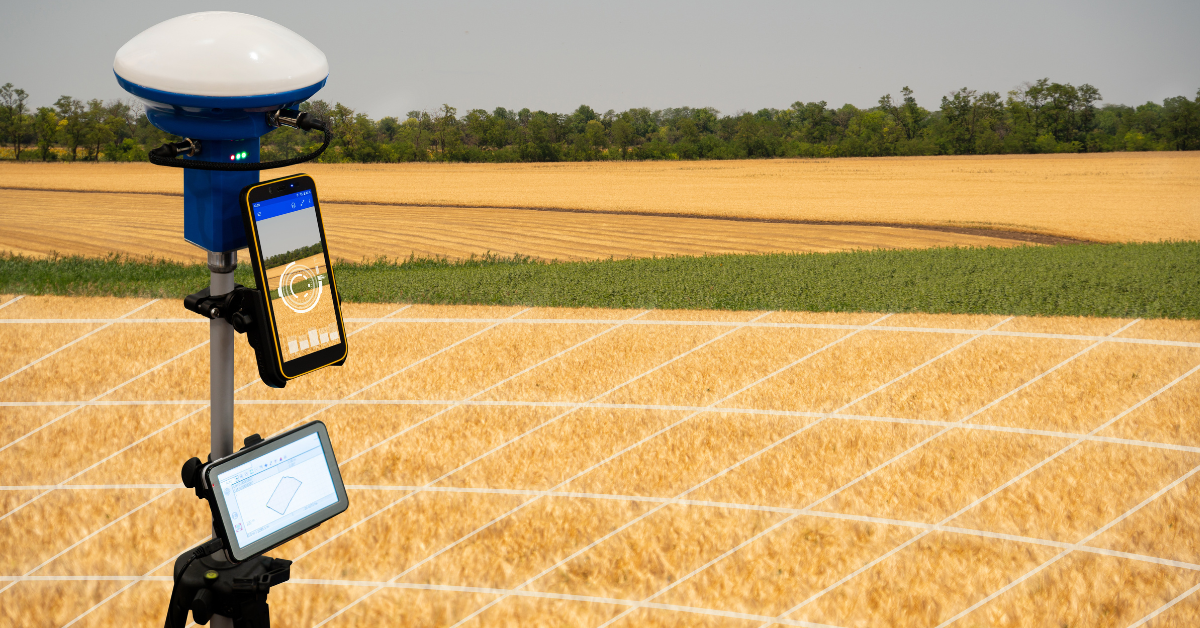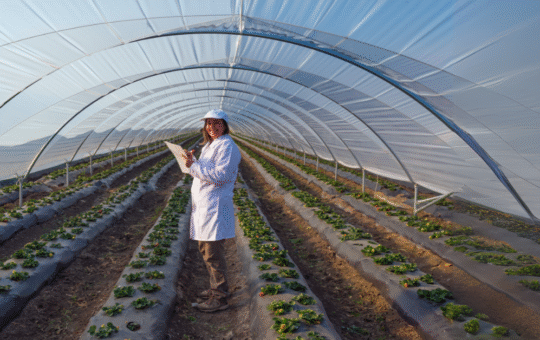
Level 3 Precision Agriculture Technologies
- Advanced Technological Knowledge: Gain a comprehensive understanding of modern farming technologies, including GPS systems, drones, and data analytics.
- Increased Farm Efficiency: Learn how to optimize crop yields and resource use while minimizing waste, leading to more sustainable and cost-effective farming practices.
- Data-Driven Decision Making: Understand how to use data to make informed decisions about planting, irrigation, fertilization, and pest control.
- Marketability: As the agricultural industry increasingly moves towards technology-driven solutions, this certification enhances employability and career prospects.
- Environmental Impact: Develop skills in managing farm resources sustainably, reducing environmental footprints while improving productivity.
- Understand Precision Agriculture Principles: Gain an overview of precision agriculture concepts, its history, and future trends in agriculture.
- Utilize GPS and Geospatial Data: Learn how to use GPS systems and geospatial data for field mapping, crop monitoring, and resource management.
- Implement Remote Sensing Technology: Understand the use of drones and satellite imagery in monitoring crop health, soil conditions, and environmental factors.
- Analyze Agricultural Data: Learn to collect, process, and analyze agricultural data to optimize farm management practices.
- Improve Soil and Crop Management: Use precision agriculture technologies to monitor soil conditions, improve irrigation practices, and optimize fertilization.
- Implement Variable Rate Technology: Gain practical knowledge in applying variable rate technology (VRT) for efficient and tailored application of seeds, fertilizers, and pesticides.
- Sustainability in Precision Agriculture: Learn how precision technologies help promote sustainable farming practices by minimizing waste, optimizing resource use, and increasing crop yields.
- Introduction to Precision Agriculture
- The evolution of precision agriculture and its role in modern farming.
- Key principles and technologies used in precision agriculture.
- Global trends and challenges in agriculture that drive the adoption of precision technologies.
- GPS and Geographic Information Systems (GIS) in Agriculture
- Overview of GPS systems and their role in precision agriculture.
- Using GIS to map and analyze farm data for improved field management.
- Understanding how to integrate GPS with farm machinery for automated operations.
- Remote Sensing and Drones in Agriculture
- The role of drones and satellite imagery in monitoring crop health, soil conditions, and weather patterns.
- Understanding the types of sensors used in remote sensing technologies (e.g., thermal, multispectral).
- Practical applications of drones for aerial surveys, yield monitoring, and precision irrigation.
- Data Collection and Management for Precision Agriculture
- Techniques for collecting farm data from sensors, GPS systems, and remote sensing tools.
- Managing and storing large datasets efficiently.
- Understanding data accuracy and precision in agricultural settings.
- Data Analysis and Decision-Making
- Introduction to data analysis tools for agricultural decision-making.
- Using data to improve crop management, predict yield outcomes, and detect pest or disease threats.
- How to make actionable decisions based on data insights.
- Soil and Crop Health Management
- Using precision agriculture technologies to monitor soil conditions and optimize irrigation.
- Managing crop nutrition and improving pest control using precision methods.
- Utilizing soil sensors to understand moisture levels, temperature, and nutrient content for better management.
- Variable Rate Technology (VRT)
- Introduction to VRT and its applications in seeding, fertilization, irrigation, and pesticide use.
- How VRT helps reduce costs and environmental impact by applying inputs only where they are needed.
- Practical use of VRT systems in precision agriculture equipment.
- Sustainability and Efficiency in Precision Agriculture
- The role of precision agriculture in reducing the environmental impact of farming.
- How technology can improve sustainability by minimizing resource use and waste.
- Case studies of successful precision agriculture operations and their environmental benefits.
- Precision Agriculture Specialist
- Agricultural Technology Consultant
- Farm Manager (Technology-Focused)
- Crop Management Analyst
- Drone Operator for Agriculture
- Agriculture Data Scientist
- Sustainability Consultant in Agriculture
- Hands-On Learning: Practical experience with industry-standard technology and software used in precision agriculture.
- Industry-Relevant Skills: Learn the tools and techniques that are in high demand in modern farming operations.
- Expert Tutors: Learn from experienced professionals with extensive backgrounds in agricultural technology and innovation.
- Flexible Learning Options: Study part-time or full-time to fit your schedule, with access to online resources and support.
- Focus on Sustainability: Learn how to integrate sustainable practices into farming while improving productivity and profitability.
Study Units
- Introduction to Precision Agriculture
- The evolution of precision agriculture and its role in modern farming.
- Key principles and technologies used in precision agriculture.
- Global trends and challenges in agriculture that drive the adoption of precision technologies.
- GPS and Geographic Information Systems (GIS) in Agriculture
- Overview of GPS systems and their role in precision agriculture.
- Using GIS to map and analyze farm data for improved field management.
- Understanding how to integrate GPS with farm machinery for automated operations.
- Remote Sensing and Drones in Agriculture
- The role of drones and satellite imagery in monitoring crop health, soil conditions, and weather patterns.
- Understanding the types of sensors used in remote sensing technologies (e.g., thermal, multispectral).
- Practical applications of drones for aerial surveys, yield monitoring, and precision irrigation.
- Data Collection and Management for Precision Agriculture
- Techniques for collecting farm data from sensors, GPS systems, and remote sensing tools.
- Managing and storing large datasets efficiently.
- Understanding data accuracy and precision in agricultural settings.
- Data Analysis and Decision-Making
- Introduction to data analysis tools for agricultural decision-making.
- Using data to improve crop management, predict yield outcomes, and detect pest or disease threats.
- How to make actionable decisions based on data insights.
- Soil and Crop Health Management
- Using precision agriculture technologies to monitor soil conditions and optimize irrigation.
- Managing crop nutrition and improving pest control using precision methods.
- Utilizing soil sensors to understand moisture levels, temperature, and nutrient content for better management.
- Variable Rate Technology (VRT)
- Introduction to VRT and its applications in seeding, fertilization, irrigation, and pesticide use.
- How VRT helps reduce costs and environmental impact by applying inputs only where they are needed.
- Practical use of VRT systems in precision agriculture equipment.
- Sustainability and Efficiency in Precision Agriculture
- The role of precision agriculture in reducing the environmental impact of farming.
- How technology can improve sustainability by minimizing resource use and waste.
- Case studies of successful precision agriculture operations and their environmental benefits.
Upon completion of this course, learners will be able to:
- Understand Precision Agriculture Principles: Gain an overview of precision agriculture concepts, its history, and future trends in agriculture.
- Utilize GPS and Geospatial Data: Learn how to use GPS systems and geospatial data for field mapping, crop monitoring, and resource management.
- Implement Remote Sensing Technology: Understand the use of drones and satellite imagery in monitoring crop health, soil conditions, and environmental factors.
- Analyze Agricultural Data: Learn to collect, process, and analyze agricultural data to optimize farm management practices.
- Improve Soil and Crop Management: Use precision agriculture technologies to monitor soil conditions, improve irrigation practices, and optimize fertilization.
- Implement Variable Rate Technology: Gain practical knowledge in applying variable rate technology (VRT) for efficient and tailored application of seeds, fertilizers, and pesticides.
- Sustainability in Precision Agriculture: Learn how precision technologies help promote sustainable farming practices by minimizing waste, optimizing resource use, and increasing crop yields.
The Level 3 Certificate in Precision Agriculture Technologies is designed for individuals seeking to specialize in the application of cutting-edge technologies to improve farming efficiency and sustainability. This qualification is ideal for:
Farm Managers and Operators
Farm managers or farm operators interested in enhancing farm productivity through the integration of modern agricultural technologies like GPS, drones, and data analytics.
Agricultural Technicians and Specialists
Technicians who wish to expand their skills in precision farming and learn how to apply technology for crop and soil management, irrigation, pest control, and other key areas.
Agricultural Consultants
Consultants looking to provide high-tech farming solutions and guidance to farmers, agribusinesses, and agricultural organizations.
Agricultural Entrepreneurs
Aspiring entrepreneurs who want to develop precision agriculture solutions or tech-driven services for the agricultural industry.
Environmental Sustainability Professionals
Professionals dedicated to sustainable farming practices, looking to understand how precision agriculture can minimize waste, optimize resource use, and reduce environmental impact.
Data Analysts in Agriculture
Individuals with a background in data analysis or computer science looking to apply their skills to the agriculture sector, using data to inform farming practices and optimize decision-making.
Students and Recent Graduates
Individuals with an interest in agriculture technology who are looking to start a career in precision agriculture and contribute to the future of farming through the use of modern technologies.
Drone and GIS Enthusiasts
Those with a passion for drone technology, GIS, and remote sensing, and who are looking to specialize in their application within the agricultural sector.
Researchers in Agricultural Technologies
Researchers focused on exploring new technologies and innovative practices to optimize farm productivity and sustainability.
Our assessment process is designed to ensure every learner achieves the required level of knowledge, skills, and understanding outlined in each course unit.
Purpose of Assessment
Assessment helps measure how well a learner has met the learning outcomes. It ensures consistency, quality, and fairness across all learners.
What Learners Need to Do
Learners must provide clear evidence that shows they have met all the learning outcomes and assessment criteria for each unit. This evidence can take different forms depending on the course and type of learning.
Types of Acceptable Evidence
Assignments, reports, or projects
Worksheets or written tasks
Portfolios of practical work
Answers to oral or written questions
Test or exam papers
Understanding the Structure
Learning outcomes explain what learners should know, understand, or be able to do.
Assessment criteria set the standard learners must meet to achieve each learning outcome.
Assessment Guidelines
All assessment must be authentic, current, and relevant to the unit.
Evidence must match each assessment criterion clearly.
Plagiarism or copied work is not accepted.
All learners must complete assessments within the given timelines.
Where applicable, assessments may be reviewed or verified by internal or external quality assurers.
Full learning outcomes and assessment criteria for each qualification are available from page 8 of the course handbook.
Top Courses
No results found.
Related Courses
Let's Get in touch
Deleting Course Review
Course Access
This course is password protected. To access it please enter your password below:



